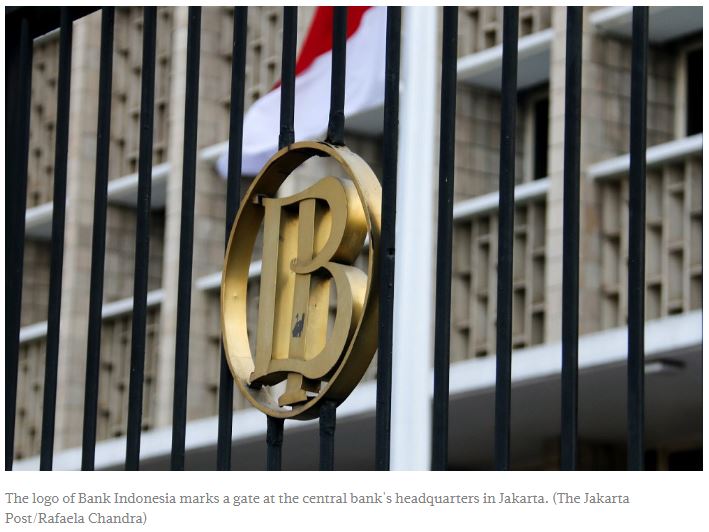Indonesia: BI holds benchmark rate to safeguard rupiah, pledges further support for economy
Bank Indonesia (BI) decided on Tuesday to keep its benchmark interest rate unchanged to safeguard the rupiah’s exchange rate amid financial market volatility but pledged to pursue other ways of quantitative easing to support the coronavirus-battered economy.
The benchmark seven-day reverse repo rate was maintained at 4 percent for a fourth consecutive month, while the deposit facility and lending facility rates were also kept at 3.25 and 4.75 percent, respectively, the central bank said following its two-day policy meeting. The central bank cut the rate four times earlier this year.
“This decision took into account the need to maintain the stability of the rupiah exchange rate as we expect inflation to remain low,” BI Governor Perry Warjiyo told reporters in a virtual briefing. “BI will undertake quantitative easing measures through liquidity provisions, including BI’s support for the government to speed up budget disbursement to support economic recovery.”
The central bank seeks to prevent further declines in the currency by maintaining the interest-rate differential after global investors have pulled around US$10 billion out from the country’s financial markets so far this year. The rupiah has depreciated by 6.2 percent so far this year, making it the worst performer in Asia, as the coronavirus pandemic hit the country’s economy and financial markets hard.
“BI projects that the rupiah exchange rate will continue to strengthen as it remains fundamentally undervalued” supported by a narrow current account deficit, low inflation and attractive interest rate differential, Perry said.
The governor said inflation would fall short of the central bank’s target of between 2 percent and 4 percent this year, as the country had recorded monthly deflation for the third consecutive month in September. Indonesia’s annual inflation rate was 1.42 percent in September.
The central bank has turned to other ways to support the economy, including by buying government bonds, cutting the reserve requirement ratio and undertaking monetary expansion, as it tried to support the economy, which is heading for its first full-year contraction since the 1998 Asian financial crisis.
The government expects the economy to shrink by between 0.6 percent and 1.7 percent this year.
BI has bought Rp 320.56 trillion ($21.73 billion) worth of government bonds so far this year as part of what is called a burden-sharing program and has bought an additional Rp 60.18 trillion in the primary market to help finance government spending.
The government has allocated Rp 695.2 trillion in COVID-19 stimulus spending to support economic recovery and strengthen the healthcare system. It also widened its state budget deficit to more than 6 percent of the gross domestic product (GDP) this year in an effort to support its expenditure amid a decrease in tax revenue.
Indonesia’s GDP shrank 5.32 percent year-on-year (yoy) in the second quarter, with economists and government officials projecting another contraction in the third quarter due to weakening purchasing power and business activity.
BI data show that loan growth has slowed significantly, falling to just 0.12 percent yoy in September from 1.04 percent yoy in August, as demand for credit remained sluggish. At the same time, third-party funds rose by 12.88 percent yoy, indicating a change in consumer behavior toward saving rather than spending.
The central bank also pledged on Tuesday to continue its efforts to stabilize the country’s currency, to strengthen its monetary operations, to improve policy implementations to support micro, small and medium enterprises, as well as to strengthen the digital economy through collaboration between banks, financial technology companies and e-commerce platforms.
BI might hold its benchmark interest rate for the rest of this year to maintain rupiah stability amid heightened global uncertainty, Permata Bank economist Josua Pardede said, adding that lowering the benchmark rate would not be effective now to boost the economy.
“There is room for further cuts as inflation remains low and the current account deficit narrows, but BI may not use it immediately because of the uncertainty,” he told The Jakarta Post. “Once the pandemic has been contained and people’s confidence in the economy has recovered, it would create the perfect momentum for BI to cut again its benchmark rate.”
Josua said fiscal policy measures were key to reviving consumer spending and demand for credit over the immediate term, adding that getting the pandemic under control would help restore people’s confidence in the economy.
“After that, macroprudential policies could be more effective in supporting economic growth,” he added.
Source: https://www.thejakartapost.com/news/2020/10/13/bi-holds-benchmark-rate-to-safeguard-rupiah-pledges-further-support-for-economy.html


 English
English




